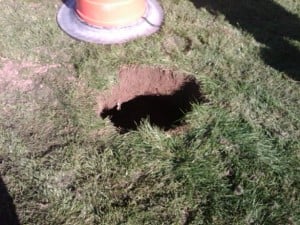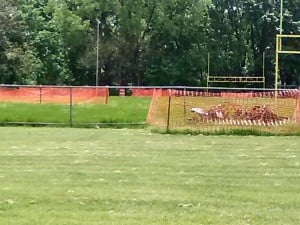 It will likely cost at least $1.9 million to rehabilitate the Verona High School football field, but the building rubble that was used to fill the field when it was expanded four decades ago is not toxic. That is the conclusion of an engineering report presented to the Board of Education on Tuesday evening.
It will likely cost at least $1.9 million to rehabilitate the Verona High School football field, but the building rubble that was used to fill the field when it was expanded four decades ago is not toxic. That is the conclusion of an engineering report presented to the Board of Education on Tuesday evening.
In late winter, French & Parrello Associates dug into 12 spots across Sellitto Field, as the upper field has come to be known, that had been flagged in a survey of the field with ground penetrating radar. What they dug up was not pretty: The photos in the report, which you can view here, show chunks of concrete, asphalt and steel rebar just inches beneath the surface of the field. Much of the landfill used to create the field in the late 1970s came from a demolished Edison factory in West Orange. The junk wasn’t packed down properly, so gaps developed and water ran through, eroding the surrounding dirt and sinkholes developed. The hole that opened in August 2012 was the shaft of a well that apparently was part of a series of utility tunnels that were put on the property when it was a boys’ home at the turn of the century.

French & Parrello outlined three ways of remediating the situation on the fields. We could simply put a large fence around the site, lock it and never use it again. That would cost $97,500, and the firm noted that there was no guarantee that the state Department of Environmental Protection would approve that plan.
On the opposite end of the cost spectrum, we could dig the entire mess up, haul it away, and fill the field with what it should have been filled with in the first place. Cost: $7,135,750, a number that is not very palatable in light of the $9.1 million in work that the Board of Education has already identified for a referendum.

What’s next? French & Parello’s report will be added to the engineering studies that will be used as the basis of a referendum that will cover a wide range of buildings and grounds issues. (It is unlikely that the PILOT money that is being used to fund the construction of two multipurpose sports fields at the Hilltop will be shared with the schools.) BOE President John Quattrocchi said at Tuesday’s meeting that the referendum would likely be put to a vote early next spring. Assuming it passes, the field could be playable again in the fall of 2014.
The consultants’ presentation and the audience questions are at the start of this video from the BOE’s May 14 meeting:


A.J.Rombough was the grading contractor.I remember their D-8 cat dozer pushing those big chunks of debris off! Where was the soil inspector. I guess he was doing something more important?
The whole thing does make me wonder about construction practices back then.
Pay for the sins of our father, another pain in the tax!